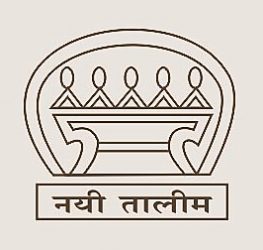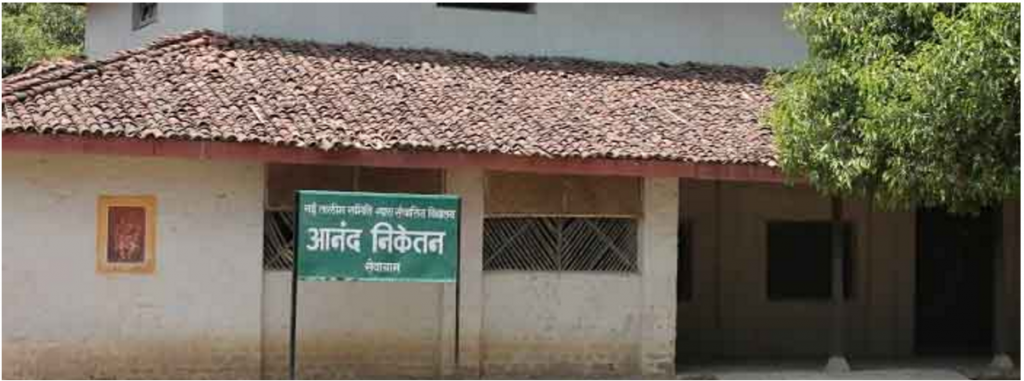SCHOOL PHILOSOPHY
School aims towards holistic development of a child i.e. the development of head, heart and hand. It equally aims for the development of a responsible citizenship. The development of intellect with compassion, humility and respect for all life forms, non violence and respect for mother earth is considered important. It believes in a transformative role of education towards a non exploitative and sustainable world. Since education is meant to get ready for life, so the learning process ought to be integrated with life.
HISTORICAL BACKGROUND
Mahatma Gandhi said that ‘Nai Talim’ was his last and the best gift to the nation. In 1937, he presented the concept of Nai Talim for a new social order much before independence viz. in 1937 that was in tune with the culture and needs of our nation. This experiment was successfully conducted in Sewagram and other parts of the country for many years. The Nai Talim school at Sewagram together with Teacher’s Training Institute and various levels of learning activities from pre-primary (Purva-Buniyadi) to Rural University (Uttam Buniyadi) was a unique and path-breaking experiment which continued for decades. After independence, due to Government apathy and other reasons this novel experiment was closed down in Sewagram in 1974. On the occasion of Ashadevi Aryanayakam Birth Centenary in 2004 an All India Conference on Education was organized in Sewagram. All the participants expressed their strong disapproval to the current system of education and expressed the need for ‘Nai Talim’ as an alternative vision to it.
This was followed by consultations with the like minded educational institutions and individuals who shared the same concern and were equally serious about initiating an alternative educational programme. Nai Talim Samiti initiated and took up the responsibility and this resulted in the reopening of Anand Niketan since July 2005.
WHAT IS NAI TALIM ?
• Nai Talim promotes the use of the real world as classroom and appreciates learning through life. The real world to the child is the closest environment in which children grow. It is the world of adults, their relationships and occupations. It harnesses the learning inputs spread over the entire surrounding environment and the society.
• For Nai Talim, relationship with nature is not with a sense of conquest but with a sense of harmony and humility.
• Its vision is a just world order directed towards the cooperative self-reliant neighborhood societies/self reliant in most basic needs.
• It integrates physical work and the intellectual work for a new social order and also for the efficient learning as “learning by doing” is the best method of learning ever known. (Most modern neuroscience research supports this contention.)
ABOUT ANAND NIKETAN
Anand Niketan School inherits the same Nai Talim campus and the buildings where the historic experiment was conducted. Peaceful, pleasant, full of greenery and pollution-free atmosphere provides an ideal place for children’s education. Currently, there are three levels of pre-primary and grades 1 to 9 with a total of 225 children. Every year there has been an addition of one more grade as a natural growth. As a first stage of our work, it was decided to take the school to seventh grade. After review, it was decided to upgrade the school up to tenth grade.
SCHOOL FEATURES
• Learning takes place at the individual level, thus the freedom of the child to work with his/her own pace is honoured. There is no competition, no ranking. A joyful atmosphere is created.
• Medium of instruction and learning is the vicinity language i.e. Marathi.
• English is learnt as a language from class I. Hindi comes to children informally from the very beginning i.e. preschool, but formal introduction and writing work starts only from 5th grade.
• Taking responsibility for one’s own learning to become intellectually, physically and emotionally self-reliant is encouraged.
• Emphasis is given on learning through day-to-day life skills and crafts. Many activities of this type come under the free life skill activity at the, pre-school level. At primary level proper cleaning of class-rooms, ground, urinals, toilets, etc., is regularly done by teachers and children together. Cooperative weekly cooking class by class also takes place. Children enjoy various activities involved in the production and preparation of food. Gardening, spinning, hand stitching and embroidery, machine stitching, hand-paper making, bicycle repairing etc.
are the other crafts that are practiced regularly at primary level. Weaving, carpentry, etc. are some other crafts to be incorporated at higher primary level. Crafts help in imparting dexterity and aesthetic sense. It helps to develop self-esteem arising from a sense of worth and confidence in one’s competence.
• Carefully graded scientific educational material and real life situation for the learning of mathematics and sciences is made available to children. Use of integrated pedagogy is the special feature of the school.
• A well set computer lab also expases students to the basics of computers and their creative use.
• Creative expression through various art forms is given importance. Drawing and painting, paper folding, clay work, traditional art forms like ‘Alpana’, music, and dance are incorporated in the programme on a regular basis.
• Games are loved by children. It has an important role in the personality development of children. A wise combination of indoor and outdoor games, group games and traditional form of group and individual performance i.e. Malla-khamb forms the regular feature of the school for girls and boys both. There is a special time slot of 1/2 to 1 hour daily reserved for the physical activity.
• The vegetative and animal life that exists around the child becomes a part of the nature study.
• Special effort is taken to see that there is a free dialogue with the children on topics evolving out of individual and collective felt need, emotional and socio-cultural contacts.
• Self evaluation is encouraged and appreciated. Children are encouraged to think.
• An atmosphere of cooperation is built during most of the indoor and outdoor activities.
• An effort is done to relate learning to socio-cultural reality that exists around children so as to build up their analytical ability and to lay the foundation of responsible citizenship. Essential exposures are planned for the same.
JOURNEY SO FAR
Strength of the school is a team of committed teachers ready to learn and work innovatively in co-operation. The experiment has a clear direction, however it believes that an “Education” is a constantly changing phenomenon in response to the changing situational needs. We would like to encourage creative abilities required for the same. We know that this is just a beginning. This is a learning process for all of us-the students, the teachers, the parents and the management. We are aware of the fact that together we think and work, better will be the results. We hope that the school plays a transformative role in the life of all of those involved in it and gives us an experience of inner growth, strength and satisfaction. It will also be an inspiring example for the society. We are also happy to say that it has been through the sincere efforts on the part of teachers that the school has been recognized as ‘Heritage School’ by National Council of Educational Research and Training (NCERT).
CHALLENGES AHEAD
The school has now reached grade 10. We also intend to develop the school as a Resource Centre for other organizations and teachers. An option of residential school is also open at the second stage of work. The challenge is to work out the operational details for the excellent craft based learning model based on Nai Talim philosophy. A team of committed and able teachers and fellows is the basic human requirement. There has been a huge social and political pressure on all schools with Marathi or a regional language as the medium of instruction. This cannot be certainly termed as scientific and pedagogically correct act ! However, most parents, the market economy and also the Government, ignoring children’s right to learn through their mother tongue/ the language of vicinity, are putting undue pressure on children to learn through English medium making the whole learning stressful for the kids. We intend to address this situation by teaching through the language of the environment i.e. Marathi so that children have the advantage of joyful, fast and perfect learning and also to be closely rooted in the socio-cultural world around. At the same time the inevitable situational need of learning good English is being catered by introducing effective ways of teaching and learning English.
AN APPEAL
There is a great need of social support to such educational initiatives in the interest of children and a larger society. It is important that freedom and autonomy of such experiments is preserved to get basic insights on education. This will also help to maintain prerogative of directing educational agenda
in the hands of the society. Anand Niketan being mainly committed to the lower socio-economic sections of the society, its need for sustaining the recurring costs can hardly be met by parents. Thus, we appeal all friends and well wishers to support us morally, intellectually and financially in this endeavour. Nai Talim Samiti is an educational Charitable Registered Trust and has registered under section 80G of the Income tax Act. Nai Talim Samiti is also registered under Foreign Exchange Regulation Act. Donation or help may please be sent in the name of Nai Talim Samiti, Sewagram, Dist- Wardha, (Maharashtra) 442102.
For more details visit the school website https://anandniketansevagram.wordpress.com


